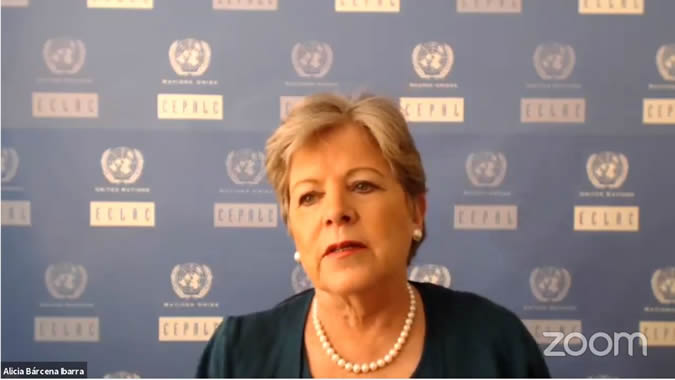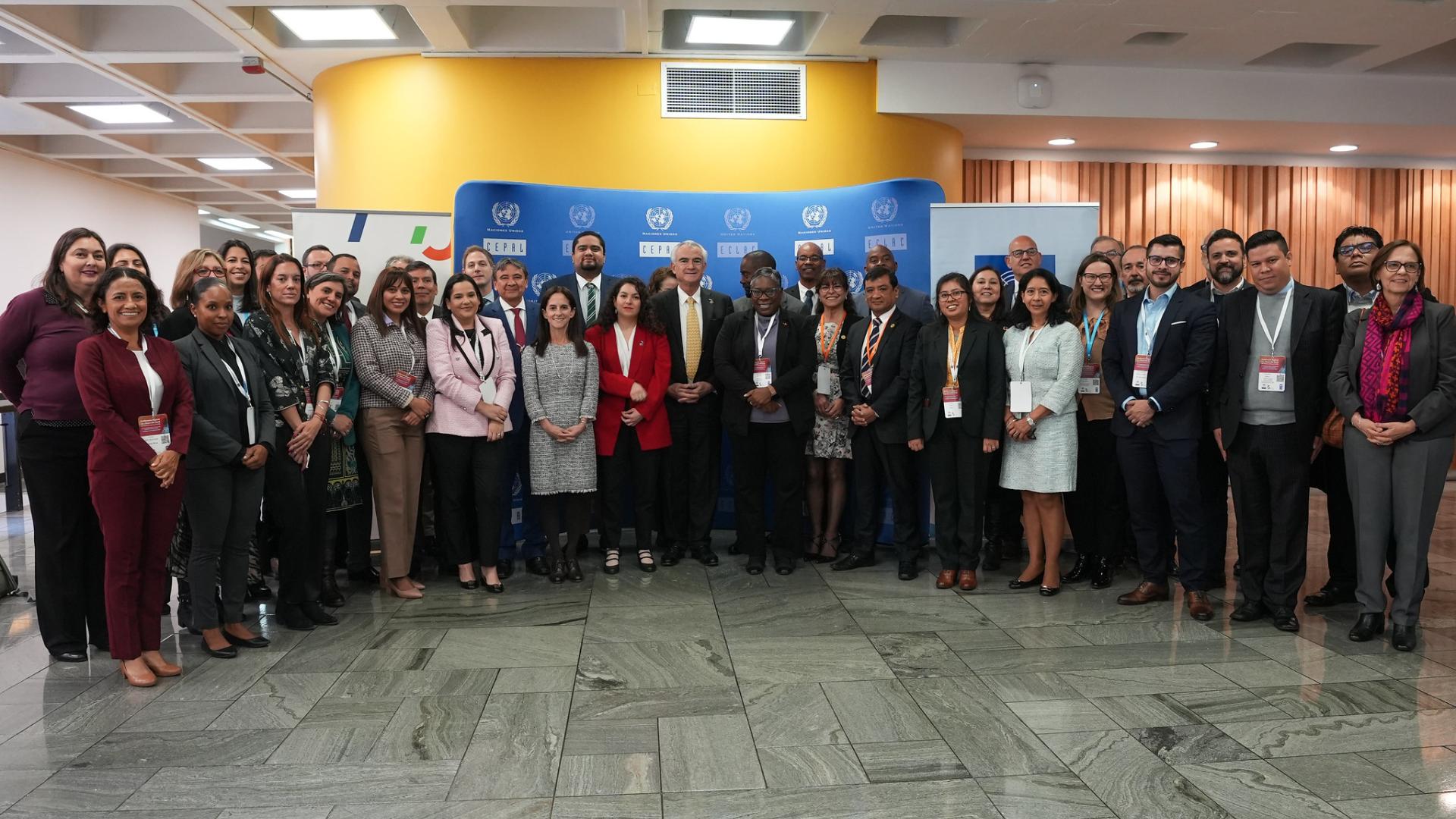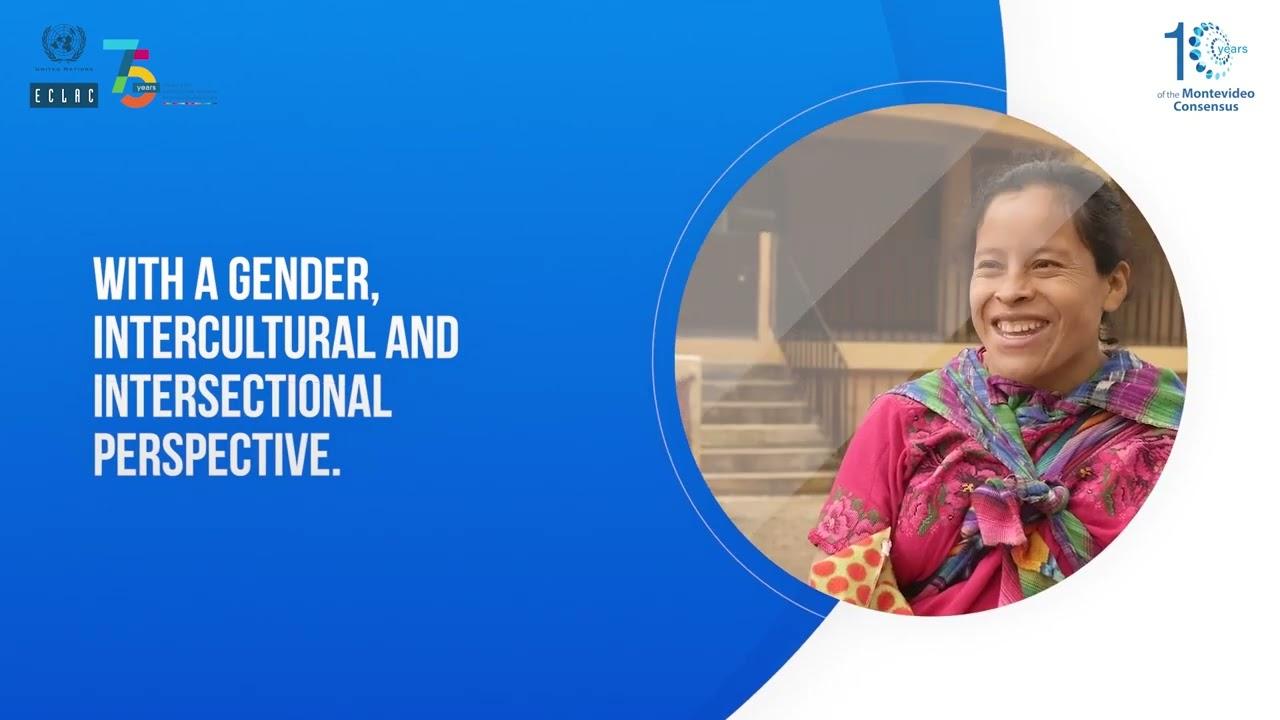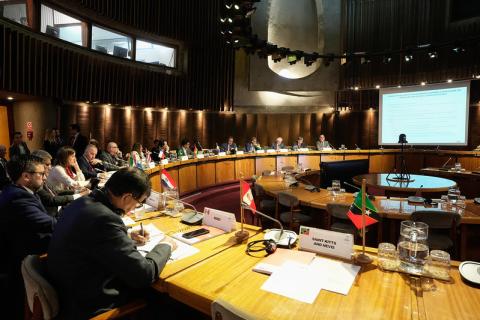Briefing note
Greater international financial cooperation is crucial for the countries of Latin America and the Caribbean to be able to expand their fiscal space to tackle the economic, social, productive and environmental vulnerability they have experienced for years, and which has been worsened by the crisis stemming from the coronavirus, ECLAC’s Executive Secretary, Alicia Bárcena, indicated today.
The highest authority of the Economic Commission for Latin America and the Caribbean (ECLAC) participated this Tuesday, May 26, in a series of high-level virtual events in which she warned that the region’s countries are living through a “perfect storm” since, like many other developing economies, in addition to currently fighting the effects of the COVID-19 pandemic, they have also been facing for some time a combination of adverse internal conditions and growing external constraints that has increased their vulnerability in numerous areas.
Alicia Bárcena indicated that the region is experiencing the biggest economic recession this century, higher unemployment, and an increase in the number of people living in poverty in a context of grave structural gaps – all of this in a scenario of more external restrictions and less liquidity available for emerging economies.
During the virtual seminar “One crisis leads to another: Challenges and responses across emerging economies in the time of COVID” – organized by the University College London (UCL) Institute for Innovation and Public Purpose (IIPP), directed by the prestigious economist Mariana Mazzucato – Alicia Bárcena stressed that the pandemic has exposed the region’s structural problems, which are compounded by the challenges stemming from COVID-19. The event was moderated by Antonio Andreoni, Associate Professor in Industrial Economics at UCL and Head of Research at the IIPP, and also included the participation of Jayati Ghosh, Professor of Economics at the Centre for Economic Studies and Planning of Jawaharlal Nehru University in New Delhi, and Richard Kozul-Wright, Director of the Globalization and Development Strategies Division at the United Nations Conference on Trade and Development (UNCTAD). In this interactive debate, the participants addressed the prospects for a reactivation in line with a global new deal that necessitates greater international cooperation.
“Internal and external factors have combined to produce the worst economic contraction in the region’s history (-5.3% forecast for 2020). But the pre COVID-19 story of Latin America and the Caribbean was not a success growth story either and was marked by high levels of inequality and an absence of progressive structural change,” Bárcena stated.
“We are experiencing a very unfair globalization. There are huge asymmetries on a global level. That is why we need special assistance from the international community to confront this crisis,” the senior United Nations official emphasized.
“We must focus on inequality because we want to avoid the culture of privileges. Inequality conspires against resilience and the way in which we are confronting the pandemic. We must address its structural causes in our region,” Bárcena stated.
ECLAC’s Executive Secretary also noted that in an interdependent world dominated by financial markets, such as today’s, countries cannot build up fiscal space by themselves. In other words, not even the most austere fiscal management can ensure developing countries the policy space they need to face the international liquidity crunch that prevails at this time. “This is precisely why international cooperation and financial assistance for emerging markets is irreplaceable under the current circumstances in which many countries are highly indebted,” she insisted.
Meanwhile, during an event entitled “The Economic and Social Impact of COVID-19 in Latin America and the Caribbean” – organized by the School of Global and Public Affairs of IE University (headquartered in Madrid, Spain), which is directed by Susana Malcorra (former Foreign Minister of Argentina and Chef de Cabinet of former United Nations Secretary-General Ban Ki-moon) – Alicia Bárcena reiterated that the pandemic will cause the worst economic and social crisis in the region in decades, with harmful effects for employment, the fight against poverty, and the reduction of inequality.
Bárcena explained that the measures needed to stop the spread of the coronavirus and to save lives are leading to job losses (11.6 million more unemployed people in 2020 versus 2019) and are reducing work-related, personal and household income. This loss of income mainly affects the most vulnerable population and the high proportion of informal workers. According to the most recent data, she added, 54% of workers have no formal relationship with employers, contracts or social protection. In 2018, just 47.4% of employees contributed to pension systems, and more than 20% of them were living in poverty.
“That is why ECLAC proposes providing a basic emergency income (BEI) equivalent to one poverty line (approximately $140 dollars) over the course of six months to the entire population living in poverty,” she said. This would entail additional spending of 2.1% of GDP to reach all the people who will find themselves in situations of poverty this year, ECLAC’s Executive Secretary noted.
She also referred to the urgent need for Latin American and Caribbean countries to expand their current fiscal space and access financing in suitable conditions, given that tax collection in the region is very low, at 23.1% of GDP on average compared with 34.3% of GDP for countries belonging to the Organization for Economic Cooperation and Development (OECD). Because direct taxes are weak and evasion is very high in the region, ECLAC estimates that in 2017 the region lost $325 billion dollars, or 6.3% of GDP, due to tax non-compliance, she indicated.
“We are at a civilizing crossroads and we can only move on by seeking global solutions. This crisis is challenging the orthodox model. We need a new development model centered on equality and sustainability, and a new social compact to move towards a less fragmented and more egalitarian, more democratic and participatory world, to build-back better with environmental sustainability,” Alicia Bárcena stressed.
Later in the day, the Commission’s Executive Secretary participated in a virtual seminar entitled “Big Push for Sustainability” – organized by ECLAC, through its office in Brazil, and Global Compact – where she sustained that the international context is undergoing a paradigm shift and there is an increasingly established view that the correct combination of policies to stimulate low-carbon and sustainable investments provides opportunities for socioeconomic development.
She specified that ECLAC is putting together a renewed proposal, articulated around a Big Push for Sustainability – an approach based on coordinating policies to mobilize and accelerate sustainable investments that will fuel a new virtuous cycle of economic growth, generating employment and income and reducing inequalities and structural gaps while preserving and regenerating the natural resources base on which development depends, she said.
“Many people are talking about the new normality, but we do not want to return to where we were before, we want a better future. We believe that the big push for sustainability can be the guiding axis of a strategy for a sustainable way out of the current crisis, by contributing to forging a development pattern and becoming the driver of a virtuous development cycle. To achieve this, it is necessary to coordinate and articulate policies and actors,” she underscored.
In addition, ECLAC also participated today in the Virtual Regional Dialogue Roundtable: “Productive Reactivation with Decent Work”, organized by the International Labour Organization’s Regional Office for Latin America and the Caribbean. There, Mario Cimoli, the Commission’s Deputy Executive Secretary, spoke on behalf of Alicia Bárcena, Executive Secretary of the UN regional organization.
In his remarks, Mario Cimoli indicated that although the region will undergo a complex recession that will affect growth, employment, poverty and inequality, it is also important now to plan for a reactivation with better labor conditions and more technology, innovation and production.
“The world from here on out will no longer be the same. We must take into account that trade and global chains will not be reproduced in the same way, and that is why we must think again about regional integration, not only on the specialization of natural resources, there needs to be greater diversification of production, greater participation in work, and a stronger State,” ECLAC asserted during the day’s events.



